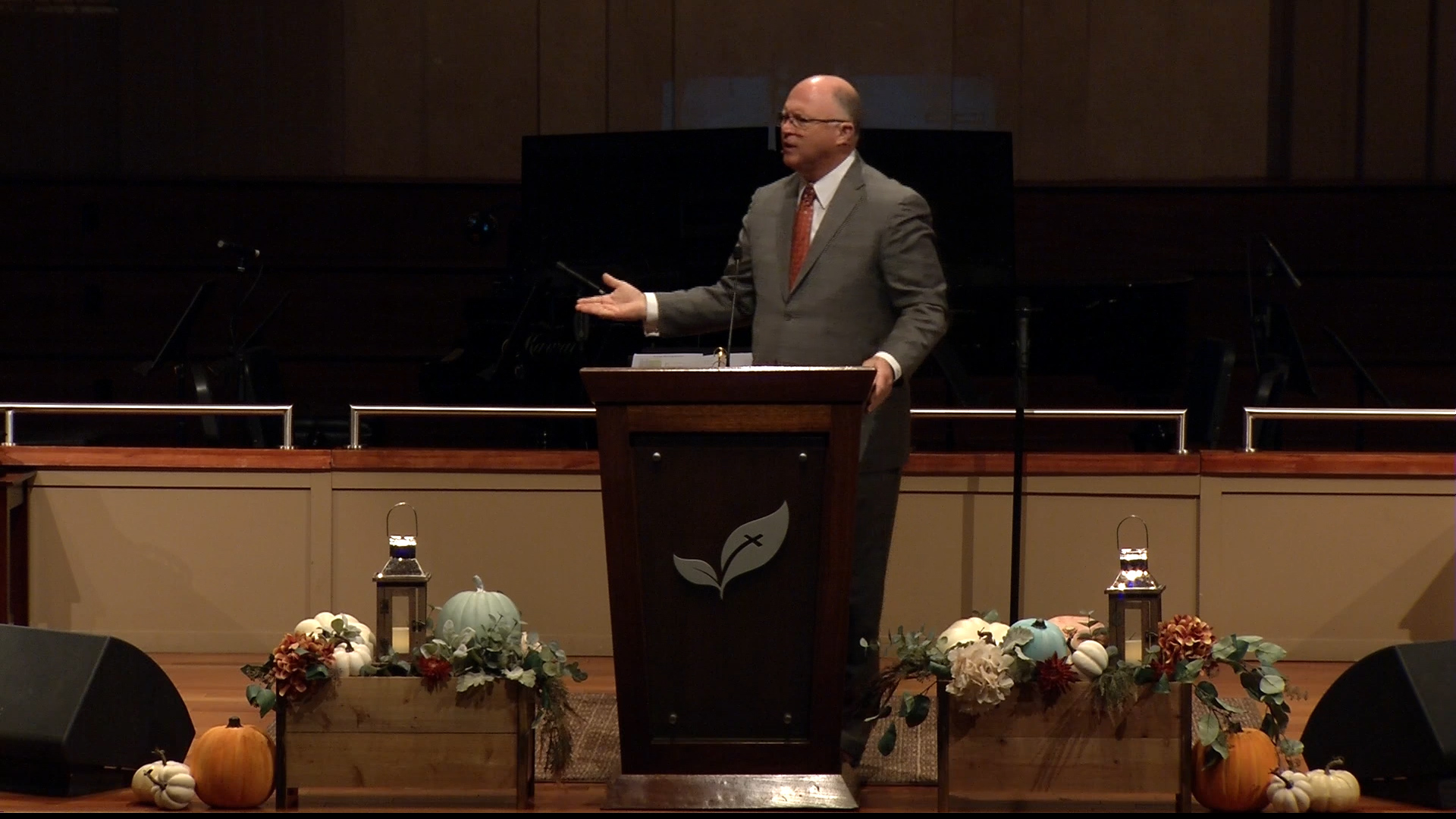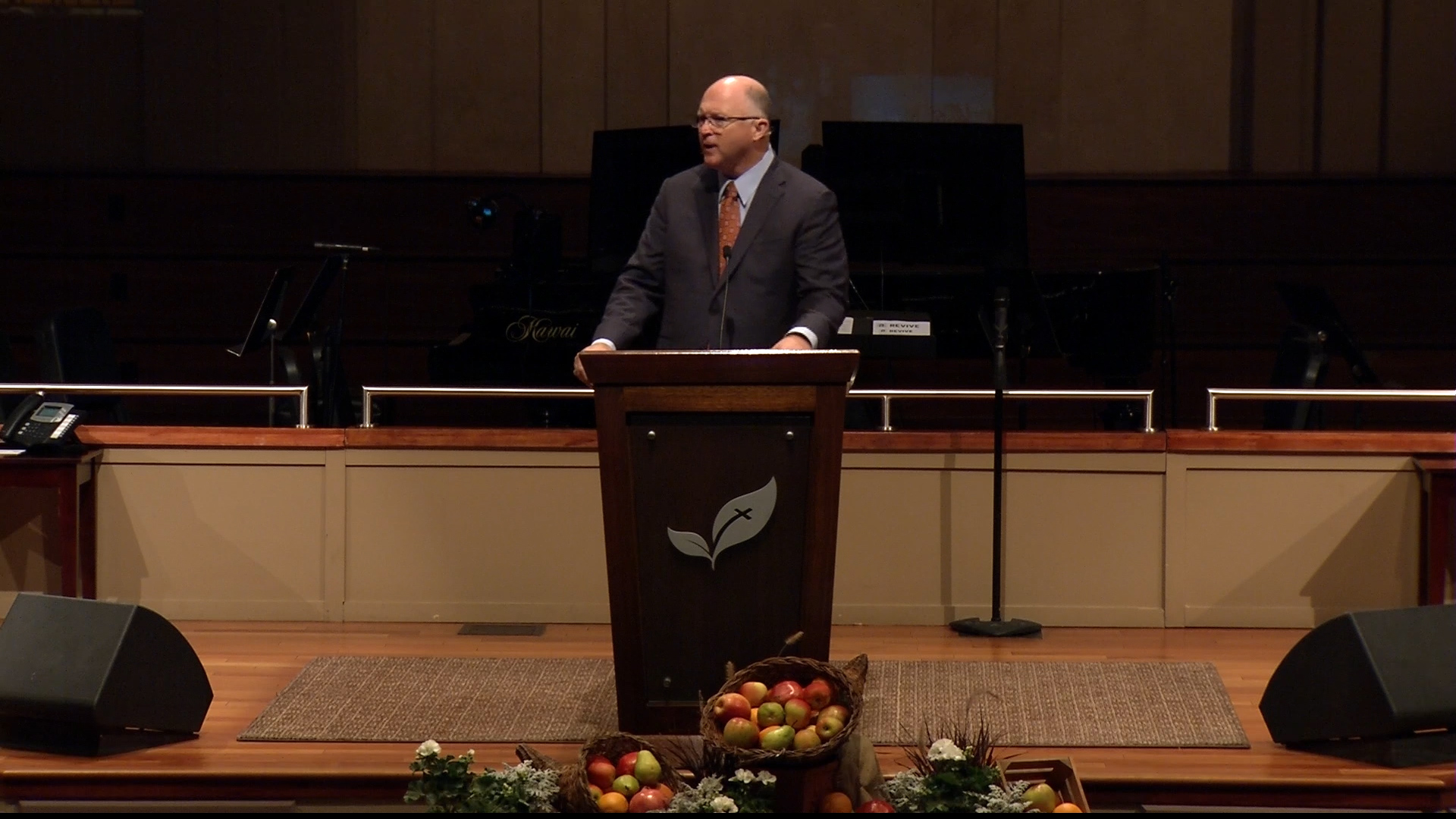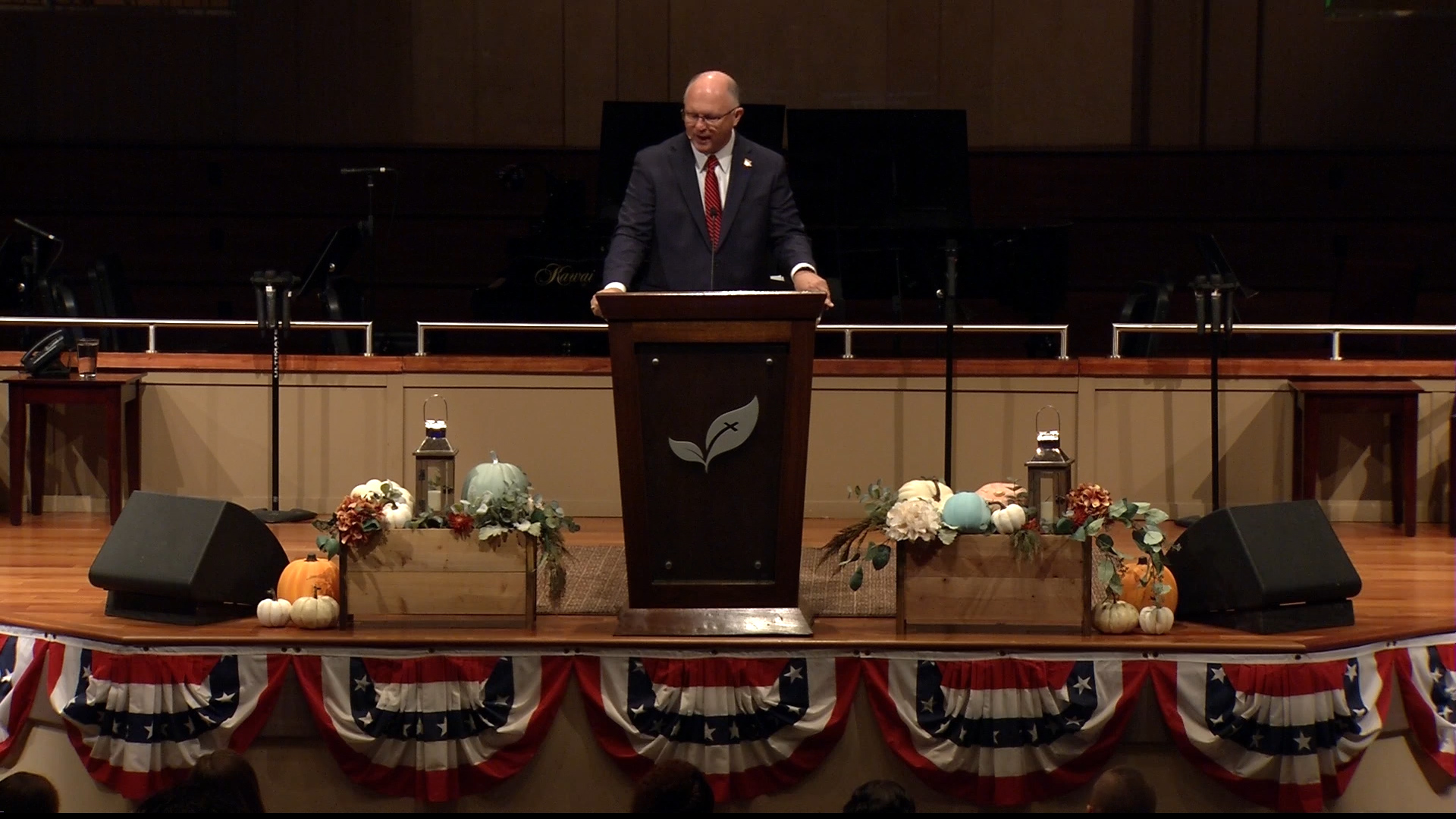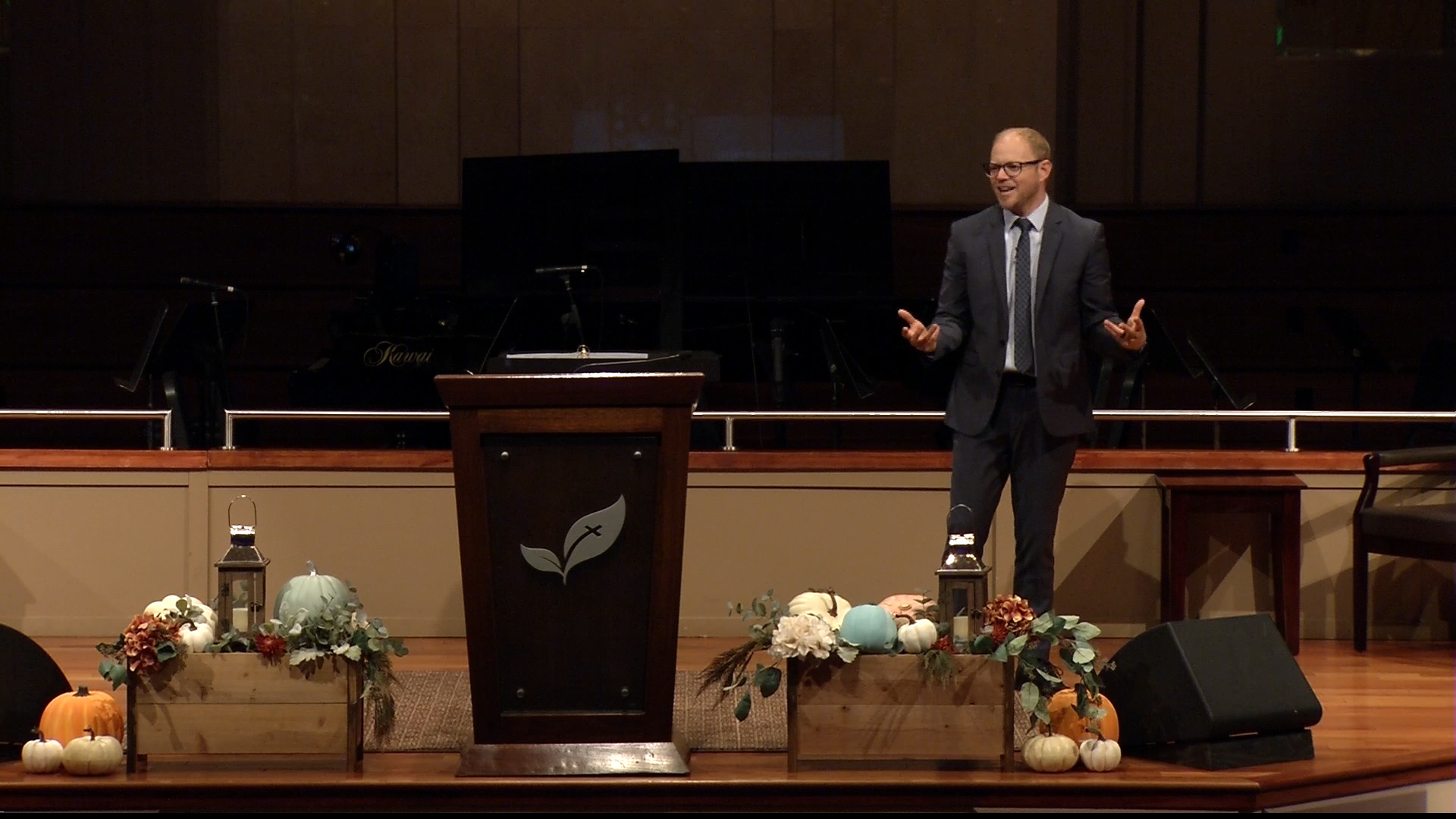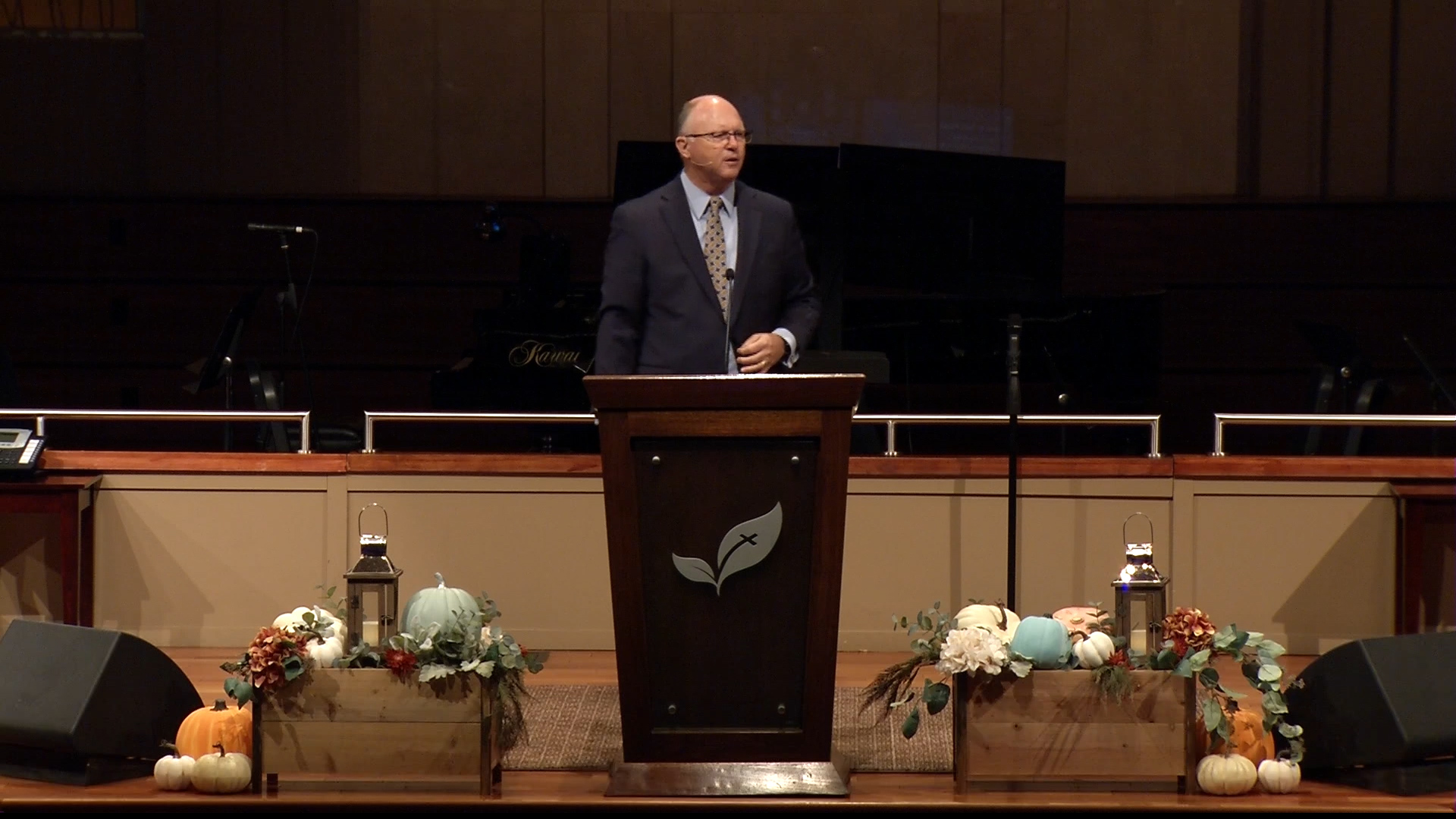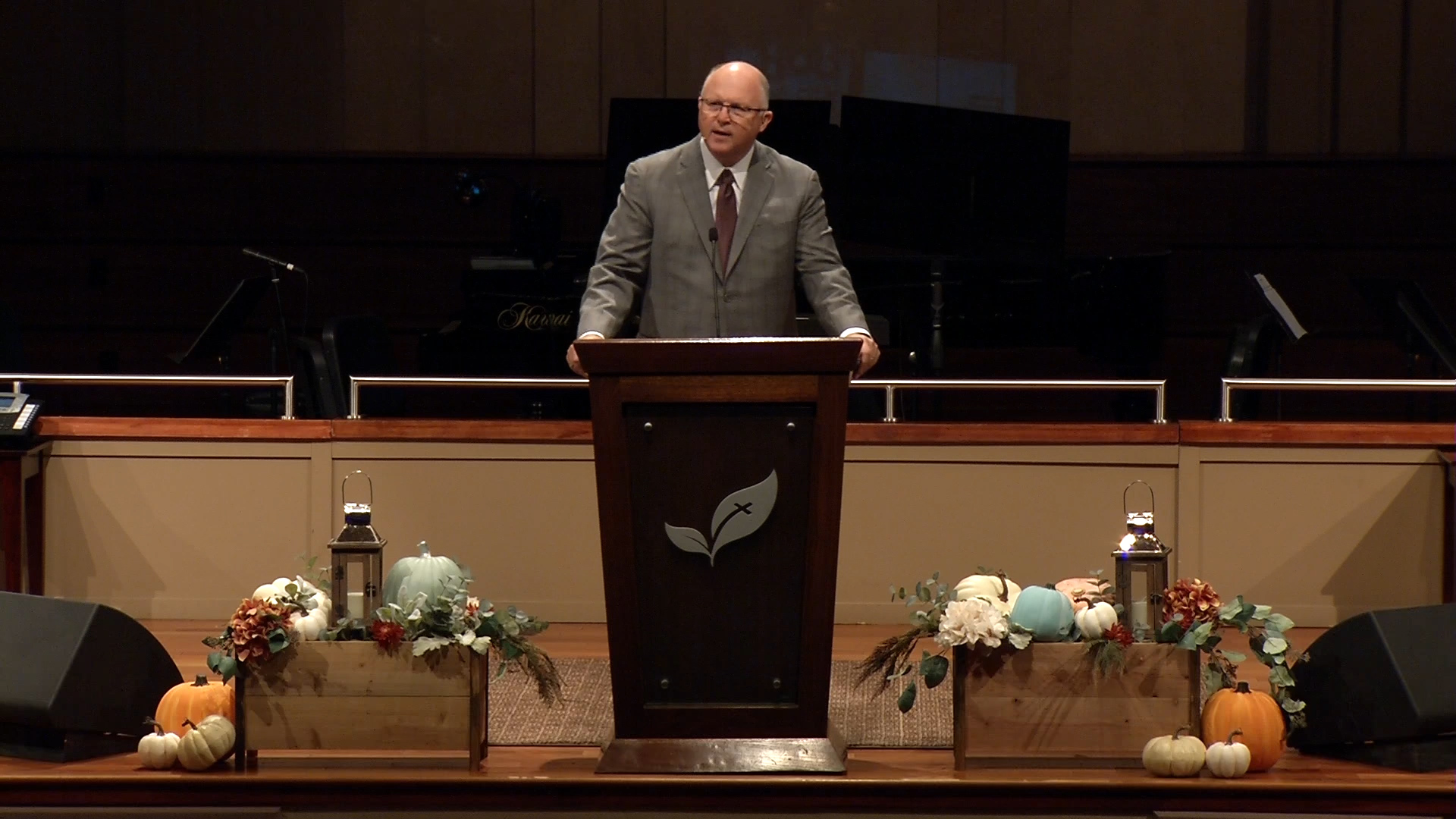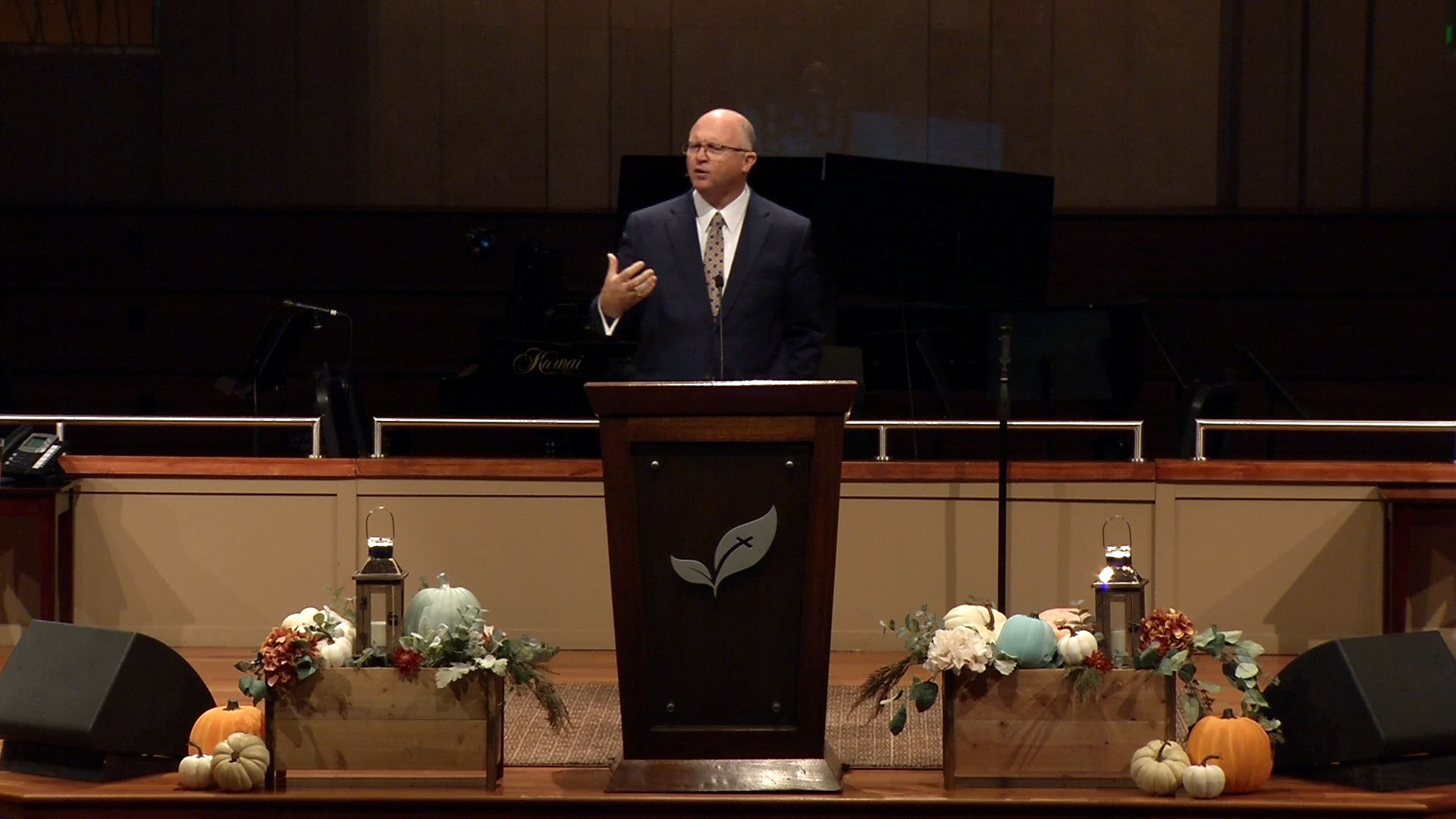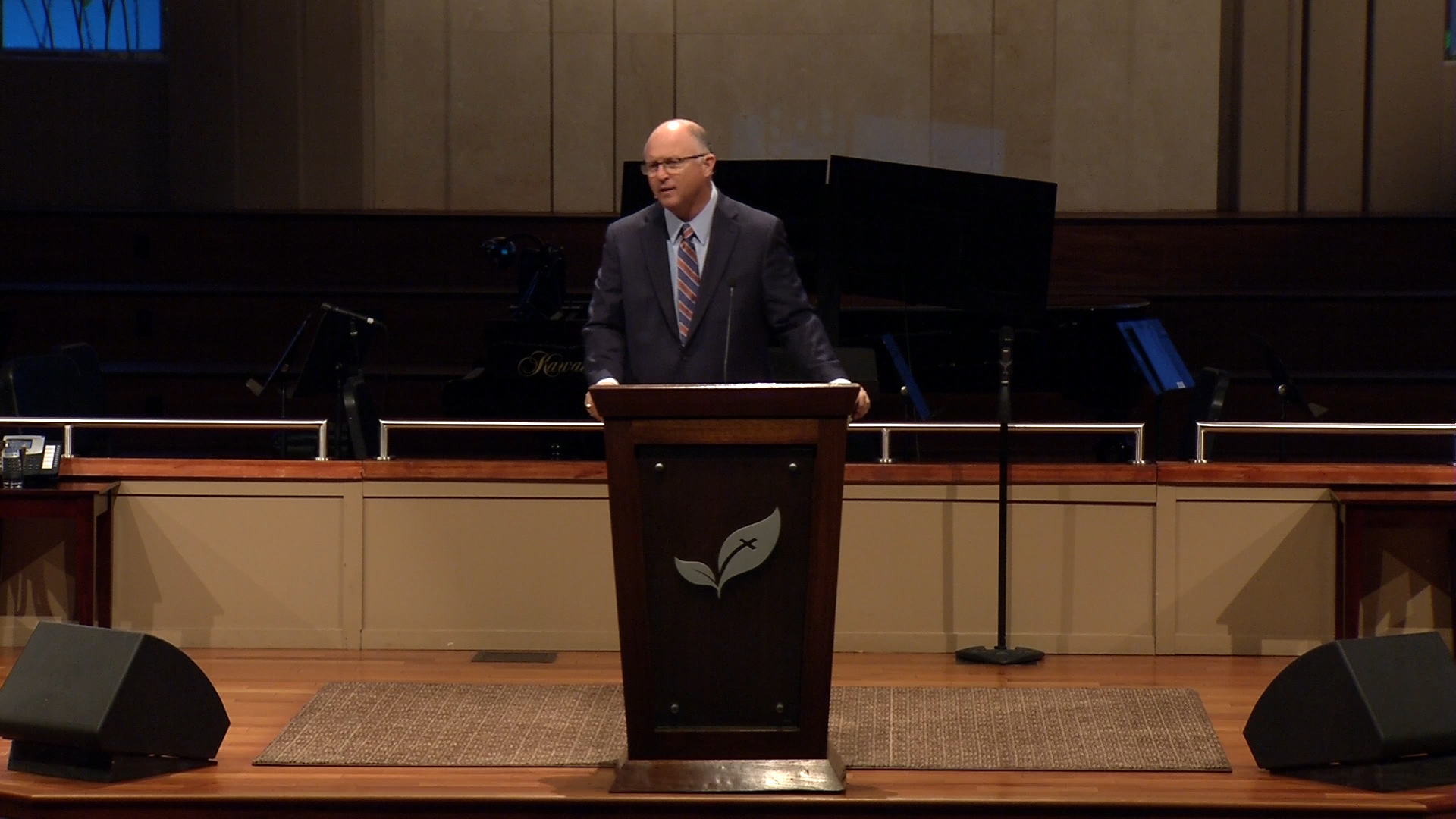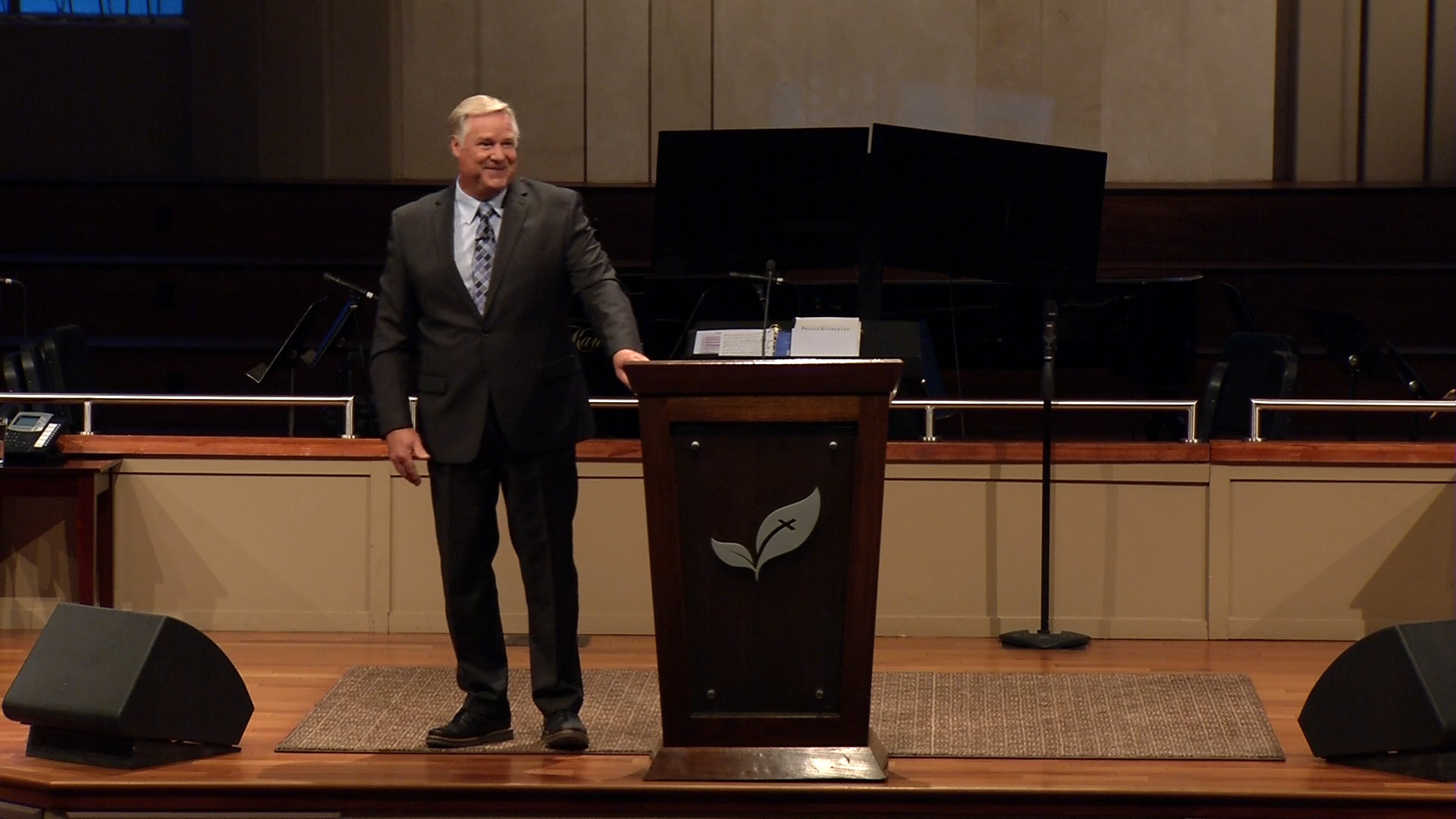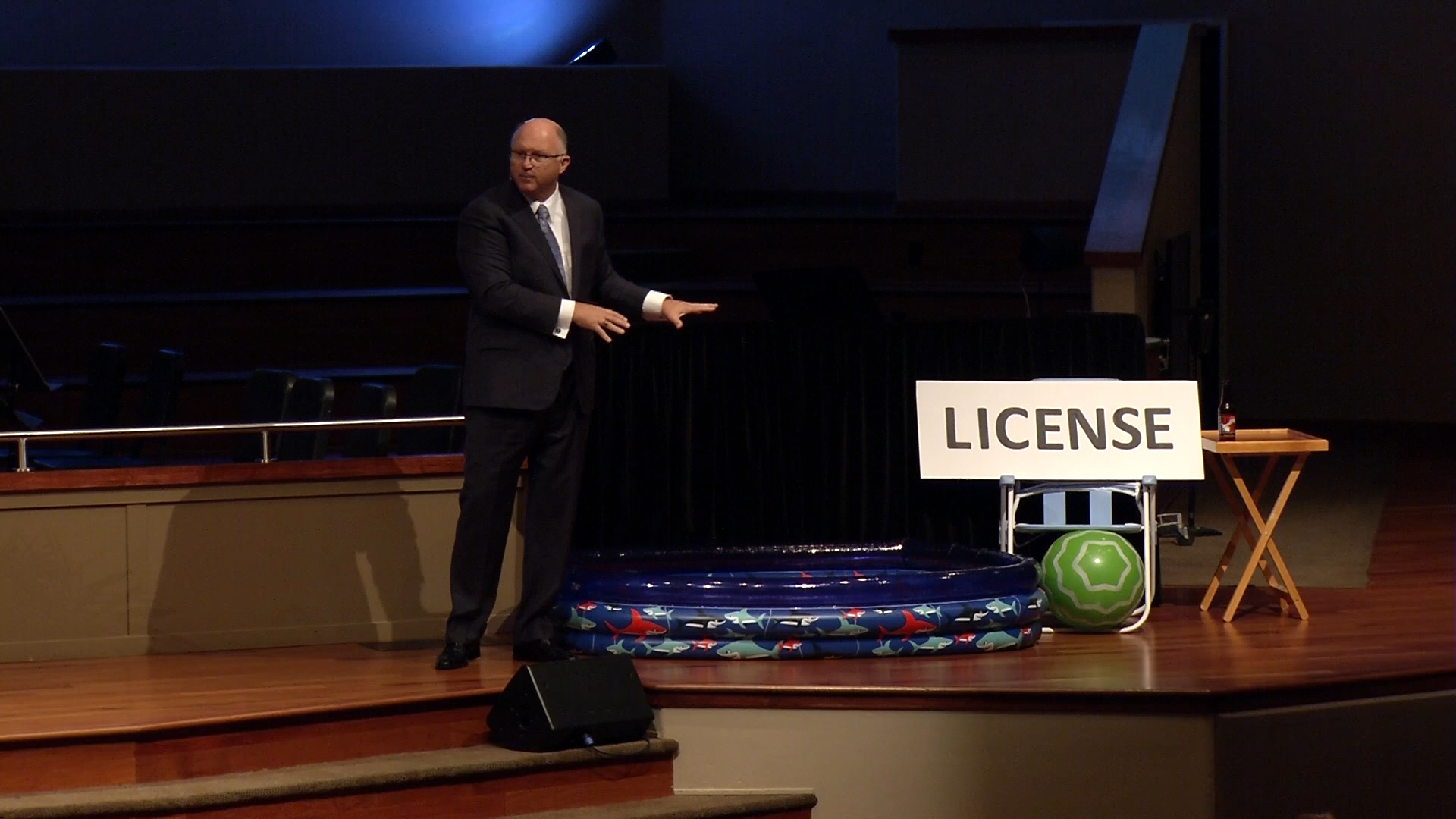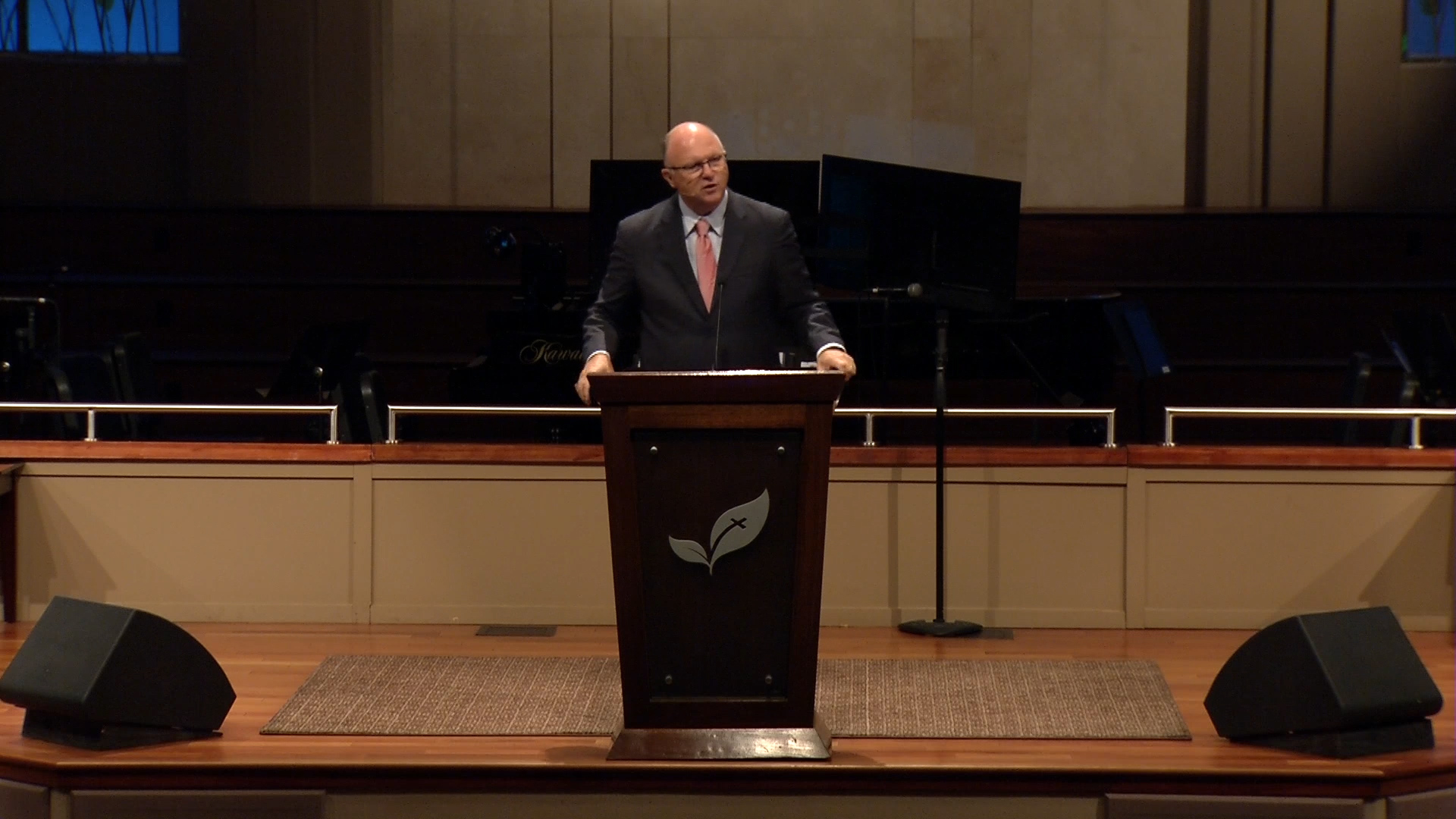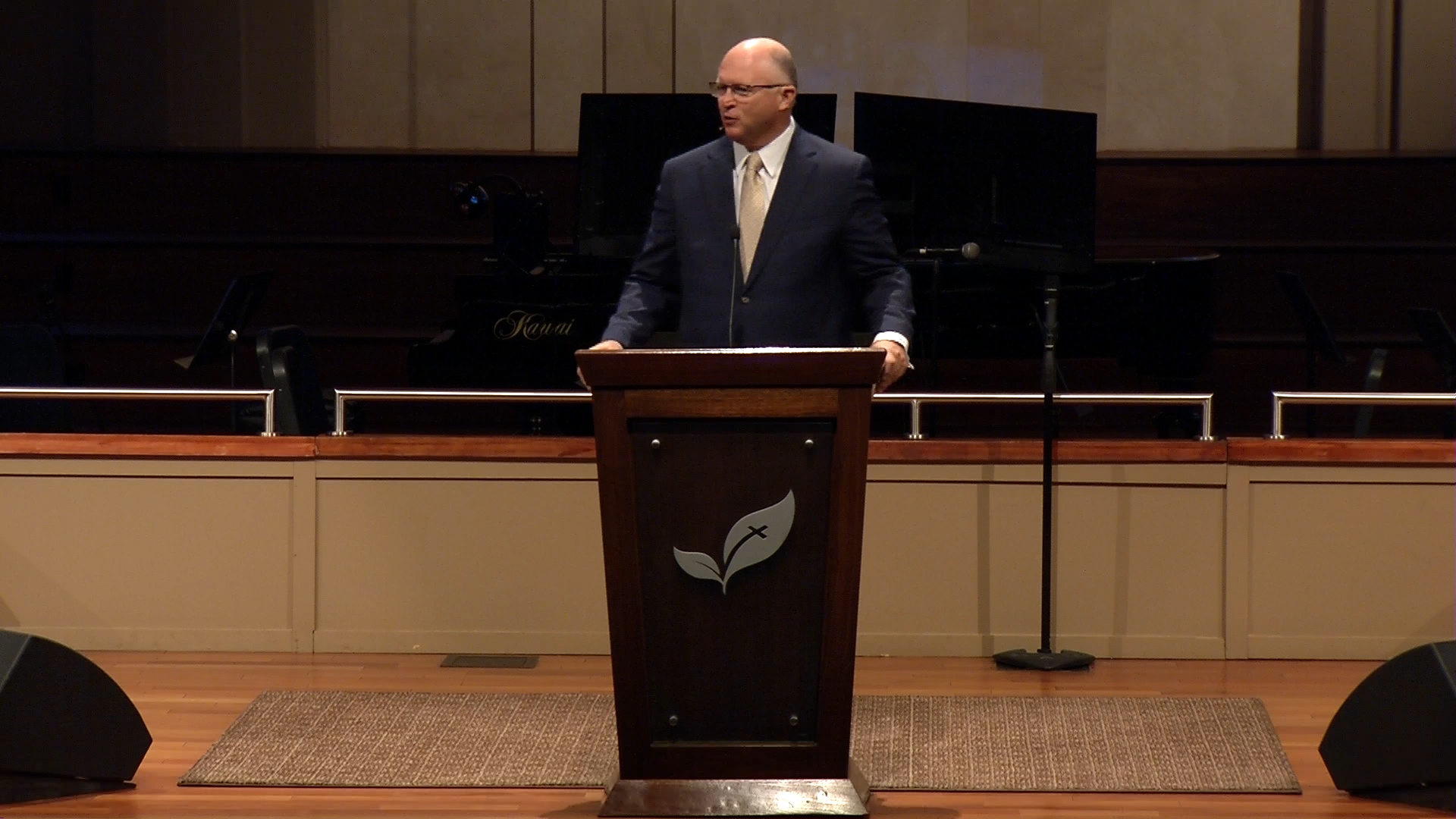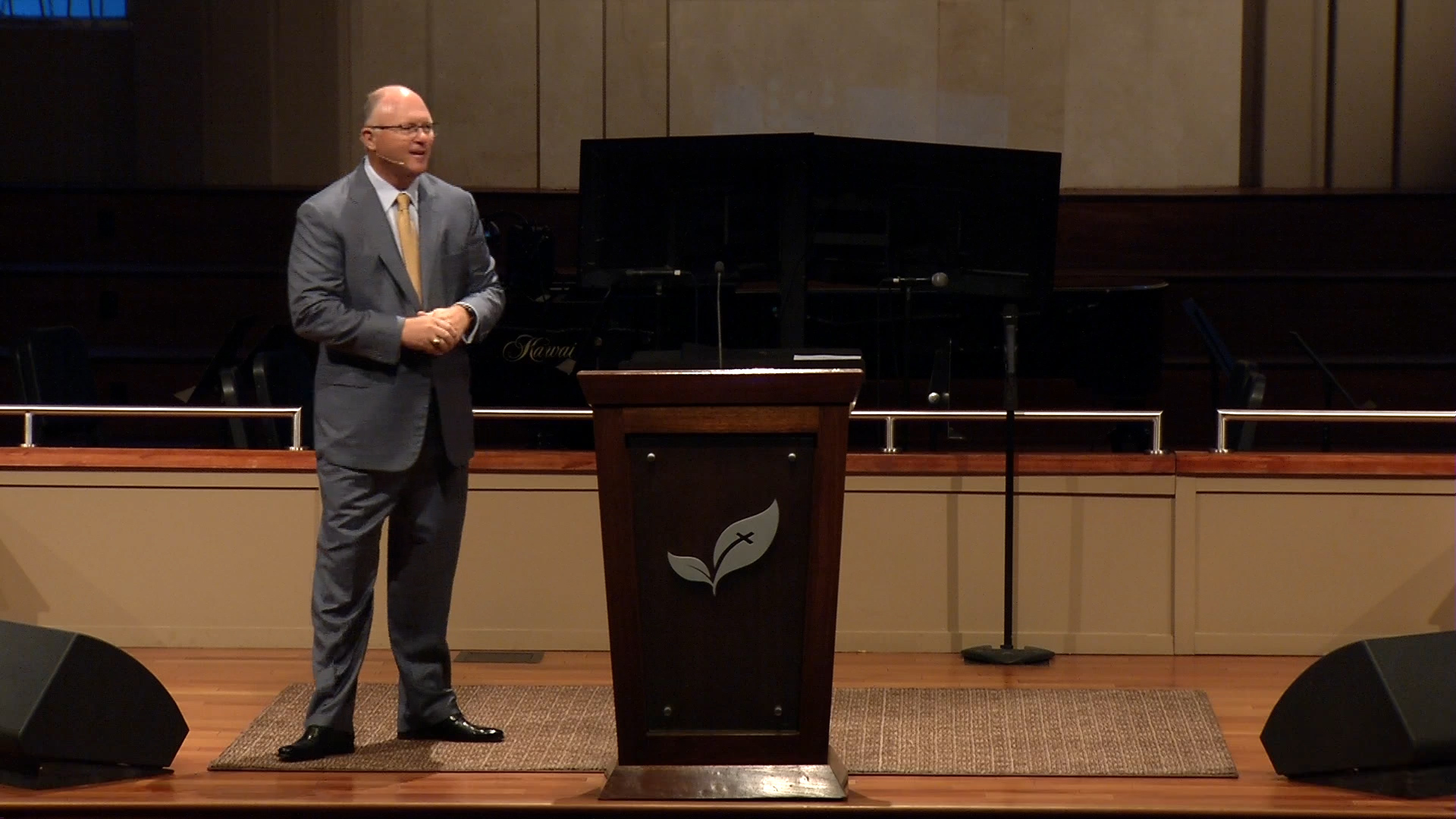Take your Bibles this morning, turn to Romans chapter 14; and if you do not have a Bible, please look inside your bulletin, you'll find the outline and all of the verses for today. And we're going to be preaching and teaching this morning on the subject of "Edifying One Another." Our series is "One Another." How do we relate to one another? How would God have us to relate at home, and in the church, and at work, and in society? And today's message is entitled "Edify One Another."
All right, so let's stand together as we turn to Romans chapter 14, and we're going to learn today about how to edify one another. We'll learn what it means and how we can be an edifying church. Romans 14, beginning in verse 16. And I'm not preaching verse 16 particularly, but I love the verse, so I wanted to read it today. Our text is going to be found mostly down towards verses 19 and following. But verse 16 is a good verse, men, for all of us to remember, and ladies as well.
It says, "Let not then your good be evil spoken of." And the whole context of Romans 14 is about grace and the application of grace. But in the application, make sure that the good testimony you have is not evil spoken of. And what a great truth that is.
Then verse 17 says, "For the kingdom of God is not meat and drink; but righteousness, and peace, and joy in the Holy Ghost. For he that in these things serveth Christ is acceptable to God, and approved of men. Let us therefore follow after the things which make for peace, and things wherewith one may edify another. For meat destroy not the work of God. All things indeed are pure; but it is evil for that man who eateth with offense. It is good neither to eat flesh, nor to drink wine, nor any thing whereby thy brother stumbleth, or is offended, or is made weak. Hast thou faith? Have it to thyself before God. Happy is he that condemneth not himself in that thing which he alloweth. And he that doubteth is damned if he eat, because he eateth not of faith: for whatsoever is not of faith is sin."
Our text this morning, verse 19, "and things wherewith one may edify another." Let's pray together.
Lord, we thank you for the infallible Word of God. We're not here to give our opinion or to hear it, but we're here to learn your eternal truth. And I pray that you would speak to us, and that we would be maturing and developing as believers this morning. And I ask this in Jesus' name. Amen. You may be seated.
Well, edification is something that every one of us need in our lives. It's something that brings us to the place of greater maturity and usefulness for the Lord. And to edify means "to build up." It means "to encourage someone in the faith," or "to encourage them in their process of growth." Most of you can remember a teacher, a parent, a coach, a mentor, someone that edified you and helped you along the way of your personal development. And many of us can remember people that weren't so good at edifying.
When I'm really looking for deep theology I often look at the Peanuts cartoons, it really helps my sermon development. And if you've ever read Peanuts you know that Lucy was not very good at edifying. In fact, you might remember Lucy's psychiatric booth, and for five cents you could go get help from Lucy, and you could walk up and tell her whatever your need was. And Charlie Brown walked up to Lucy one day and he said, "I have these deep feelings of depression. What can I do about it?" And Lucy said, "Set out of it." And then she said, "That'll be five cents, please."
Maybe you've had somebody like that in your life, you know, they're just not given to a lot of edifying or patience with you. On another occasion, Lucy told Charlie Brown, "I'm not sure what happiness means, but when I look in your eyes, I know it isn't there." And maybe you have someone like that in your life, they're just not really edifying by nature. Well, this morning we want to learn how we can fulfill this mission of edifying one another.
This particular book of Romans, of course, was written to the church at Rome, which included both Jewish and Gentile believers. And I think all of us can imagine this because we live in a very multicultural society; and I want you to think about it for a moment. These people were getting saved out of pagan backgrounds, both from the Jewish and from the Gentile backgrounds coming together; and yet they had different viewpoints on varying topics, including the Jewish holy days, and including the fact that the Gentiles would sometimes eat meat that had been offered to the idols. That was repulsive to the Jewish people. The holy days of the Jewish people were repulsive, they were not understood by the Gentile people.
And what we understand when we look at the book of Romans and the context of this church is that they literally had a choice to make. They could become very destructive in their discussion, or they could become very edifying in their discussion, all depending upon how they let grace work in their hearts. So Paul is writing Romans chapter 14 to challenge them to grow in grace; and that would include even being willing to lay aside habits from their life, like eating those meats or drinking wine, things that would have become very destructive or very offensive to the other side, being willing in a spirit of maturity to limit their liberty and to say, "You know, I'm not going to do that because I want to edify people around me. I don't want to be the point of difficulty, I don't want to be the lightening rod of argumentation, I want to be someone that is edifying with a spirit of maturity in the church."
You see, our differences can either harm the church or they can bring harmony in the church, depending upon the maturity of the believers. And God is calling upon us to be a people who edify and build one another up in the faith. And so, this morning I want to share with you some principles to become an edifying member of the church, of your family, and of this society.
The first thing I want you to notice this morning if you're taking notes is that we must have a passion for edification. In other words, this is a decision. We must decide that we will live an edifying life. In fact, in verse 19 the Bible says, "Let us therefore follow after these things which make for peace." So if we have a passion to edify we are going to live peaceably, we are going to follow after those things. The word "follow after" means "to run after this," "to eagerly seek this."
Let me ask you this question this morning. Are you following after peace with your spouse? I mean, are you actively pursuing peace? Do you seek to edify your spouse? Do you wake up in the morning with this thought, "How can I build her up today, or him up today? How can I edify my children today? How can I edify those that work with me today?" Is it something you're following after? Is it a passion in your life?
Now sometimes people say, "Well, it's difficult to live peaceably with other around us, and even in our homes." And one person said, "You know, if you could just get everyone to close their eyes for just a moment, and just close their eyes and visualize world peace for just one hour, imagine the serene and quiet we would have until the looting started."
You know, sometimes we have that impression, don't we? We have that impression that there's always going to be that bad thing that comes next, there's always going to be that difficulty around the corner. But God says, "Listen, instead of expecting the looting, instead of expecting the problem, why don't you follow after that which is pleasing to God, follow or run after the peace that he wants us to enjoy."
Now how can we live peaceably? How can we live in our families, in our church, in our society peaceably? I want to give you four steps to living peaceably right here from Romans 14 very quickly. Number one, we must stop living for self. If we're living for self we'll never be contented. If we have a narcissistic attitude that it's all about us, then we'll not find peace.
Notice in verse 7 what the Bible says, "For none of us liveth to himself, and no man dieth to himself. For whether we live, we live unto the Lord; and whether we die, we die unto the Lord: whether we live therefore, or die, we are the Lord's."
Now, folks, at some point in time you have to realize you might win the argument with your spouse, but it's not worth it. You might win the argument at work, but it's not worth it. It's not about you always getting the win. Someone said to me one time, they said, "Think about it this way: so you win, then what? What are you going to do with that win?" Really honestly, is it worth fighting over? And when we come to this realization that we live for the glory of the Lord, not for the fulfillment of self, it allows us to find peace one with another.
And so many people today have this attitude of, "I'm just going to resist. I'm just going to be against everything, because I'm just mad at everything." And God says, "It's not about you being mad at everything or winning in every area, it's about recognizing that Jesus is Lord." So we must stop living for self.
Secondly, we must realize that the gospel is the real focus. The gospel is really what matters. Look at verse 9 of this chapter: "For to this end Christ both died, and rose, and revived, that he might be Lord both of the dead and living."
You see, folks, we've got to come to this place of realizing you might get in that great political argument with some friend at work, you might be totally right, he might be some kind of an ignoramus in your mind, and you might just thump him with all of your knowledge. But how does that help you bring him to Jesus? If Jesus is really what matters in this life, and if bringing others to Jesus – I'm not saying compromise your convictions, I'm just saying sometimes we can win a battle, but we truly lose the real issue, which is sharing the Lord Jesus Christ. And so we must recognize this, that Jesus Christ came with one single focus: the Son of Man has come to seek and to save that which was lost.
Back in 1957 during the World Series, Hank Aaron came up to the plate, and the catcher was Yogi Berra, and Yogi Berra was trying to distract Hank Aaron, and he said to Hank Aaron, he said, "Hey," he said, "don't you always have the trademark facing you from the bat? You need to be able to see that trademark or you're not going to be able to hit." And as Yogi Berra was saying that, Hank Aaron reached way back and he hit that ball, he hit it out of the park, he hit a homerun. And as that ball went out over the park he came around and touched Homeplate, and when he did, he went up to Yogi Berra and he said these words, he said, "I didn't come up here to read, I came up here to hit."
Now think about this: Why are you living? What is your purpose? You see, Hank Aaron knew what his purpose was. His purpose wasn't to get in an argument with the catcher, his purpose was to hit a homerun. And when you bring someone to Jesus, you've hit a homerun. When you bring someone to Jesus, you have done what matters most. And so, we must stop living for ourselves. We must realize the gospel is the focus.
Notice, thirdly, we must realize that all things will get settled at the judgment seat of Christ. All things will get settled. Now look at verse 10 very quickly: "But why dost thou judge thy brother? Or why dost thou set at nought thy brother? For we shall all stand before the judgment seat of Christ."
How many of you have ever had something happen in your life where you were mistreated? Maybe someone said something unkind, maybe even an alleged Christian, and they kind of said something that was hurtful; and you try to kind of make it right, but it never really was made right, and it bothered you; but it still kind of felt unresolved at the end. Anybody else ever had something like that in your life? Maybe something with someone you know at church, or someone from the Christian school, or some situation like that.
Now you have two choices. You can go about stewing about it. You can quit. You can get mad. Or you can say this: "One day there is coming a day called the judgment seat of Christ, and I'm going to go ahead and let Jesus handle that. I'm going to give that wrong that I experienced to Jesus, and I'm going to go ahead and choose to forgive. And I'm going to keep going with my life and live the way that God wants me to live."
That's the choice you have, because there is a judgment seat of Christ. And for those who really missed out on their opportunity to serve God, it will be dealt with there. So sometimes it's important when you're seeking peace just to lay down the battle and let Jesus handle it in his way. By the way, he handles it way better than we do, doesn't he?
Number four, we need to avoid causing others to stumble. Now if you want to live at peace, if you want a clear conscience with those men that you work with and those ladies that you work with, whether it be at Plant 42, or at the hospital, or whether it be at some – as a sheriff's deputy, or construction, or whatever you do, as a Christian I want you to hear this.
Notice in verse 13: "Let us not therefore judge one another any more: but judge this rather, that no man put a stumbling block or an occasion to fall in his brother's way." Now I want you to think about this causing others to stumble.
We heard a message last Sunday night on alcohol consumption, and one of the great arguments against is this argument here, that I don't want to do anything, even in moderation, that's going to cause someone to stumble back into alcoholism. Some says, "But they've legalized smoking marijuana." Listen, just because this country legalizes something does not mean that it's right. They've legalized gay marriage, and God refers to that as an abomination.
The fact of the matter is that we've got to step back and look at things scripturally today. The fact of the matter is that we have to realize that anything I do – listen – as a pastor, as things that I might do, even in the realm of who's married, I don't want that to be a stumbling block, I want to be very careful in that area.
Or, someone might say, "Well, I might just take some marijuana, it's legal now." Wait a minute, I want you to understand, that's a gateway drug. I want you to understand, people look at you and they go, "He goes to church and he does that? I can do opioids. I can do these other things." And now you become a stumbling block leading someone else into an area of greater sin. And God says if we're going to be at peace with him and with other, we must not be a stumbling block.
Look at 1 Corinthians 8:8, "But meat commendeth us not to God: for neither, if we eat, are we the better; neither, if we eat not, are we the worse. But take heed lest by any means," notice now, "this liberty of yours become a stumbling block to them that are weak."
Now I see some Holy Spirit sarcasm personally in this phrase "this liberty of yours," because we're living in a day when many Christians want to talk about grace and liberty, and they want to say, "I've got liberty to do this, and I've got liberty to do that." But what Paul is saying is to the Gentile believers: "You might have liberty to take that meat; but if it's going to be a stumbling block, you should not do that. You have this liberty, but if it's going to offend the Jewish believers in the church, let's not do that." You have this liberty, you want to take that wine, but there's someone in the church trying to overcome alcoholism; maybe it's better that you just lay that down. You see, let's not be a stumbling block.
You say, "Well, I've got liberty to go to church two out of four Sundays because we're in the age of grace." But, you know, that's not going to help the young Christian who's watching you. "Dad," you say, "I've got liberty. I can go ahead and watch this show if I want." Hey, can I just tell you that when your children see those two men kissing on television and hear that profanity, it could become a stumbling block to your children.
So instead of pushing the liberty issue and saying, "I've got liberty, I can do this," Paul was saying, "Listen, if we're going to live peaceably," Paul was saying, "if we're going to get along from all these different backgrounds, let's not be pushing the grace and the liberty issue, let's think about the responsibility issue, and let's really realize that if we're going to live peaceably, we don't just do whatever we think is right. But we let our liberty cause us to, by love, serve one another."
Warren Wiersbe says, and I put this in your notes, "There is one thing we should judge: we should judge ourselves to see whether we are abusing our Christian liberty and make others stumble." Now someone might say, "Well, I'm going to tell you people right now, don't judge me. I'm not going to let that Baptist preacher judge me."
Listen, it's not about us judging one another. Here's what this author says: "Why don't we just judge ourselves. Why don't we each judge ourselves." And notice what he says, "whether we are abusing our Christian liberty and making others stumble. Certainly nothing is unclean of itself, but some practices and habits are considered unclean by others. Therefore, if we deliberately do something that makes our brother stumble, we're not living according to the rule of love."
And so, we must recognize if we're going to live peaceably that we do not want to cause others to stumble in their following after Jesus Christ. We do not want to do things in our lives that going to cause someone else to say, "He's a Christian, he did that; so therefore, I can do this." We want our testimony to help others to walk in peace after Christ. So live peaceably.
Secondly, build strongly. We want in this edification lifestyle to live peaceably, to follow after it, and then to build strongly. Look at verse 19, it says this, it says, "Let us therefore follow after the things which make for peace, and things wherewith one may edify another." We're to be looking for what can edify.
How can I edify my teenager? How can I edify that usher? How can I edify my spouse this week? We're to be looking for ways to build strongly. We're to be looking for ways to say the right thing at the right time.
Now let me just say something. Everyone here has a sphere of influence. Everyone here is in the place of being able to edify someone else, even the children in your own home. Wives, you'll never know the power of influence you have on your husband just by the spoken word, and husbands to your wives.
I was reading this past week a book entitled Leading in Turbulent Times, and it's an essay book about four different presidents, and one of the presidents was Abraham Lincoln, and they were talking about his childhood, how he became an orator at a very young age, how he enjoyed speaking. And it was interesting to me that one of his relatives said how Abraham Lincoln at ages 10 and 11 so enjoyed listening to the Baptists preachers of Illinois, that those preachers challenged him both in his delivery style and in his content.
And what I'm saying is this: we never know who we may edify with our speech and with our life. You never know on that football field or basketball court, you never know in your family devotional time what you might say that might really make a difference in someone that is greatly used of God. So build strongly and build intentionally.
North Carolina Basketball Coach Dean Smith years ago instituted a practice for their team, and he said, "This is what I want you to do." He said, "When you make a basket, I don't want you pounding your chest and strutting around like, 'Look at me.'" He said, "When you make a basket it's always because somebody passed you the ball." So he said, "When you make a basket, I want you to point at the passer," and he instituted this practice of pointing at the passer. He called it the Bobby Jones rule, and he said, "When you get that basket, point back."
What is he saying there? He's saying, "I want you to edify that guy. I want you to give praise to that guy. I want you to realize you did what you did because somebody else edified you along the way."
Can I just encourage you husbands, when God blesses your career, why don't you edify and point back to your wife? Can I just encourage teenagers, when something good happens at school, why don't you edify back to your parents? Why don't we edify one another? Why don't you edify a mentor? Why don't you edify someone who helped you? And let's remember to edify and build up one another along this journey called the Christian life. We've got to have a passion for edification.
Notice, secondly, we need to have a priority on edification. Notice the priority of edification in the Bible. Now verse 21, notice please, it says, "It is good neither to eat flesh, nor to drink wine, nor any thing whereby thy brother stumbleth, or is offended, or is made weak."
Now if we're going to make a priority of edification, first of all, we must live without offense, because when we are offensive, when we are violating Scripture, when we're pressing that liberty to do what we want to do, that doesn't edify, that destroys, that hinders, that tears down. The goal of grace is not to do what we may be free to do, but rather what will not cause offense to others. And so, the Bible is clear on this. It says, "For the grace of God that bringeth salvation to all me hath appeared to all men, teaching us that, denying ungodliness and worldly lusts, we should live soberly, righteously, and godly, in this present world." Grace is not my license to live how I want to live, grace teaches me it is God's inner-working in my heart teaching me to live soberly and righteously, so that I'll not be an offense or a stumbling block to others around me.
And so, God has called us to this life that is a life without offense. And if we offend a young Christian because of certain things we say or do, it's harder to recover them, because they'll say something like this: "Well, that guy in the church, he got drunk, he went to the party, he didn't pay his bill," whatever. God says, "Listen, guard your testimony. Live without offense in your life."
All of us are going to mess up from time to time, and certainly we're going to come back and repent to the Lord. But what we want to realize is that every action, it has a ripple effect, and it's either going to be destructive or it's going to be edifying.
Secondly, we want to live with faith, we want to live without offense. But if we are going to be making a priority of edification, we must live with faith. Now here's a great principle. Put your thinking cap on with me and look at verse 22: "Hast thou faith? Have it to thyself before God. Happy is he that condemneth not himself in that thing which he alloweth."
Now God says when you're considering a matter, maybe going to certain activities or maybe involving in certain investments or getting a job, whatever, make sure it's something that you can do in faith. Make sure it's something that by faith pleases God. And look at this phrase, if you would, in verse 22: "Happy is he that condemneth not himself." In other words, if you're being convicted of God, that's not a good action for a Christian. That word that you just said to your wife is not something that a godly man would say. If the Holy Spirit is speaking to your heart, you listen to the Holy Spirit, because the Bible says something very important here: "Happy is he that condemneth not himself."
How many of you have ever said or done something, and immediately the Holy Spirit convicted you that that was wrong? How many? Come on, everybody that's saved has felt that, right? And you're immediately like, "Oh." And, you know, this verse is so wonderful: "Happy is the man that condemneth not himself."
You see, it really isn't the church making you feel guilty. If you're saved, it's the Holy Spirit convicting you, and leading you, and trying to help us, that, "Listen, you can't do that in good faith. You can't say that in good faith. You can't give that to your neighbor in good faith. You can't gossip in good faith. You can't do this and really say that you're edifying, it's just not in good faith." And when there's a gray area or a questionable area, ask yourself this question: "Can I do that in good faith before the Lord?" because I don't want to condemn myself.
Notice, if you would, there in 1 Corinthians 8:7, "Howbeit there is not in every man that knowledge: for some with conscience of the idol unto this hour eat it as a thing offered unto an idol; and their conscience being weak is defiled." In other words, if it was wrong for them to eat this meat, but they kept doing it, their conscience is defiled. And, listen, if you know something is wrong – something you watch, something you say, something you hear – but you just keep doing it, pretty soon you don't feel conviction like you once did, and your conscience becomes defiled, your conscience becomes seared.
Can I just tell you something? You don't want a defiled conscience, you want a conscience that feels easily when God is speaking to your heart. So you want to be very careful to life in this way: "Lord, can I do this in faith, knowing that it will please you? Will this decision please you?"
Going against what God has laid on your heart is always wrong. Going against what God has laid on your heart is always wrong. If God has laid on your heart to be faithful in a particular area and God has laid on your heart to be faithful in church attendance, but you go against that, that's wrong. If God has laid on your heart to forgive someone, and then you get angry again, that's wrong. If God has laid on your heart to abstain from certain drugs or alcohol, listen, and you get into that, then you're sinning against God, and you're defiling your own conscience. So make sure that what you're doing is truly of faith, sincere faith between you and God.
Now the passion of edification is to live peaceably, and the priority of edification is that I want to live my life without offense. It's not that we're going to be perfect, we get that; but we don't want to go along the way offending our children, offending our neighbors, offending fellow church members and causing them to stumble because of the way that we live. We want our life to be a clear testimony. We want it to give a certain sound of direction every single step of the way.
Notice, finally this morning, the perfection of edification. And I want to turn in your Bible to one more passage, if you would please, Ephesians chapter 4. So everybody turn there, Ephesians chapter 4. You're doing great. We're going to go to one more text because it speaks so strongly about edification.
And when we say the perfection of edification, what we're talking about is not that we're perfect people. How many of you would agree with me there was only one perfect man? His name is Jesus Christ, right, the God-man. But the word "perfection" means "mature" or "complete." So we're going to talk about how through edification we can complete and mature one another, and I want you to see this with me.
Notice in Ephesians 4:11, it says, "And he gave some, apostles; and some, prophets; and some, evangelists; and some, pastors and teachers; for the perfecting of the saints, for the work of the ministry, for the edifying of the body of Christ: till we all come in the unity of the faith, and of the knowledge of the Son of God, unto a perfect man, unto the measure of the stature of the fulness of Christ."
Now the first thing I want you to see in this passage are the teachers of edification. God says, "He gave some." Now verse 11 says, "He gave some." Say that with me, please: "He gave some." One more time: "He gave some."
So who is the "he" here? That is Jesus Christ. You can see that in the verses prior. Jesus gave some what? He gave prophets; he gave apostles; he gave evangelists, pastors, and teachers. Now some of those roles were temporary to the first century in the sense of the apostles. The apostles, by definition, were eyewitnesses of the resurrected Christ, and so those apostles lived and died in that first century.
The prophets: they also gave revelatory messages to the church; and now that we have the Bible completed, we believe that we no longer need the office of an apostle or a prophet to give us revelation. As Baptists, we believe the Bible is our final authority in all matters of faith and practice. And so, we have the Bible plus what prophet Joe said. Is everybody with me this morning so far? We don't have the Bible plus the Book of Mormon, we don't have the Bible plus the pearl of great price, we have the Bible. All right, everybody's with me so far this morning?
So we don't have prophets in the Baptist church, but we do have evangelists, pastors, and teachers, right? And these roles continue today. And, for example, look in your notes at Acts 20:28, " Take heed therefore unto yourselves, and unto all the flock," notice this, "over the which the Holy Ghost hath made you overseers," so a pastor is an overseer; and the pastor is, "to feed the church of God, which he hath purchased with his own blood."
How many of you know that the church is not these four walls around us? Say amen. The church of God, which has been purchased, that's us. We are the saints of God; we are the church of God. And the pastor/teacher is to feed the flock of God, which is what I'm endeavoring to do right now as I teach and preach to you the Word of God, is to feed to church of God, is to edify the church of God.
So he has given some pastors and teachers. Now why did he do that? These teachers, God says, these are the teachers. Notice, if you would, in Hebrews 13 in your notes there. It says this: "Obey them that have the rule over you, and submit yourselves: for they watch for your souls, as they that must give account, that they may do it with joy, and not with grief: for that is unprofitable for you."
Now here the Bible says to the church to obey those that have the rule over you. And this is not speaking of some weird authoritarianism, it is not saying that pastor's word is equal to the Bible or that I speak ex cathedra; it is, however, to say this: Jesus gave to the church pastors and teachers, and God literally said, "Here, I have a combination for you; I have my living, infallible Word, and I'm going to give a man to you called a pastor, and he's going to impart the Word of God. And when he's imparting scriptural admonition, I want you to listen to it."
Now, look, we live in a day that is suspicious of all authority. We live in a day where people can't stand and sometimes disrespect bosses at work and political leaders and everybody in-between. And I'm going to tell you something today: if you bring that attitude into this relationship toward your pastor as he teaches the Bible, it is only to your detriment, my friend. And I did not say that because I happen to hold the office here, I would say that in any church where I ever preached.
God has ordained that a pastor hold up the Bible, and that when he is lovingly and biblically admonishing the churches to obey that direction – and the Bible says, "Submit yourself." Why? Because the pastor is watching for your soul. So if I admonish you towards missions conference, if I say, "Let's behind missions," and we see biblically the call for that, the church is to say, "Let's move with that."
If we talk about soul-winning, if we talk about family life, the Bible admonishes us to move with that direction, because the pastor is watching for your soul. And sometimes men get the idea, "Ain't no man gonna tell me what to do." Listen, friend, don't adapt that philosophy towards the pastor who's trying to help you.
I reached out to a man this week, and he's wayward from the Lord from our church. It's affecting his wife and children. I just reached out to him, I said, "Hey, I want to get together with you. I want to show you some things from the Bible. I want to help you."
Listen, folks, wise is the man who wants to hear his pastor in those moments. In fact, the Bible says obey him. He has spiritual authority in your life. He's going to give an account to God for the church some day. That's why we have the Core class, where I get all our new members together and I say, "Look, here's what we believe and here's how we operate. And I want to encourage you, don't just kind of make this church like a social club, this is a body."
That's what I'm preaching about this morning from Romans 14. How can we edify one another? And God says, "I'm going to give some teachers for your edification." Let that work the way that it's supposed to work.
But then I want you to see, not only the teachers of edification, but notice, secondly, the testimony of edification. There's a testimony that's going to come from this. Now let's look at this very quickly and we'll be done. Look at Ephesians chapter 4, and notice in verse 12. He gives these teachers, these pastors. Why? Verse 12: "For the perfecting of the saints."
So notice, first of all, that when this process is happening, the Bible's being taught, people are listening. There's going to be the perfecting of the saints. We said that's the maturing of the saints. There's this development of maturity. So people are going to forgive more quickly. People are going to listen more earnestly. People are not going to be here and there, and back and forth; but they develop a biblical maturity.
Now you can't develop that when you're neglecting the Bible, when you're neglecting the house of God. You're not going to be a mature Christian with one meal a month. But when you listen to the pastor/teacher, and when you open the Word of God, you can become a mature Christian. And until then, you'll be like a little baby in the nursery, spiritually speaking.
You're never going to be perfecting or maturing if it's just kind of a hit and miss approach to Christianity. But when you see that Jesus gave his word, and he gave a pastor/teacher – and in this church many wonderful pastor/teachers to teach Sunday school classes and all these things; and we open our heart to it. Now we begin to mature; and it's a beautiful thing to see Christians maturing in their faith.
He says, "The perfecting of the saints." But why do we need to be perfected? So that we can go to an ecclesiastical museum and say, "Look at me, I'm a very mature Christian"? So that we can be like the Pharisees who said, "I thank God I'm not as others"? No, no. God want's you to mature – notice the next phrase in verse 12: "The perfecting of the saints, for the work of the ministry." So God wants you to grow so that you can lead someone else to Jesus, so that you can disciple someone else, so that you can edify someone else. So we're the perfecting of the saints – that's us – for the work of the ministry.
So here at Lancaster Baptist we believe that every member is a minister. Let's say that together: "Every member is a minister." That was all right. Let's try it again: "Every member is a minister." Every saint is a servant. Let's try that: "Every saint is a servant."
So God says, "I want all of you to be involved." And that's why I want you to open your Bible, listen to your pastor, as the perfecting of the saints is happening, so that as you're perfected, you can get involved in the work of the ministry. Folks, we're not going to reach the Antelope Valley with just a few of us; but all of us should be involved in the work of the ministry.
Then notice the third aspect. It says, "The perfecting of the saints, for the work of the ministry," notice this, "for the edifying of the body of Christ." The edifying, God says, "I want this church to be edifying one another in the faith, encouraging and building one another up in the faith."
This past Friday night we had our Homecoming football game for Lancaster Baptist High School. And it was a tough loss for our boys, it really was. And they lost to Mammoth High School, and I told our new principal who's actually seated in this room again – God wants him to hear this counsel again one more time. I said to our new principal, I said, "Brother Ewing, we're supposed to not have such a touch opponent on Homecoming night, you know, you've got to get someone that's a little easier to beat" and so forth.
But anyways, our boys fought, they did their very best; but unfortunately, they lost. But during halftime of the Homecoming is always one of those most sacred little moments for me as a pastor, because it's when those young ladies come down from the fifty-yard line with their dads. And they always get out of these brand new trucks that are donated. And then they walk down through the field there, and the ninth grade and the tenth grade, and then all the senior court; and while they're walking they look so beautiful, their dads are with them – they sort of look handsome – and they're walking down the field together.
And then they tell the testimony of the kids, and they say things like, "This is so-and-so, and she got saved when she was seven years old on a bus on her way to Lancaster Baptist Church." And then they'll say, "This is so-and-so, and she got saved when; and her favorite verse is." "And this is so-and-so, and she got saved; and her favorite verse; and she wants to serve the Lord in this way with her life." And they just kind of start giving these testimonies, and I realize, "You know what; I'm competitive, I like to win, I want to win this football game."
But the real ministry is right there people's hearts. The real ministry is with a seven-year-old girl who's now eighteen, who's still pure – she's a virgin. She has her devotions; she loves her dad; she's growing in the Lord. That's the ministry, ladies and gentlemen. That's because a father edified her. That's because a teacher edified her. That's because a principal edified her. That's because a church wrapped their arms around these young people, and for the perfecting of the saints, for the work of the ministry, for the edifying of the body of Christ. And it's a beautiful thing to see that in action. And just right in the middle of a rugged ol' football game with all kinds of dirt and mud and smelly boys everywhere, here were some trophies of God's grace, you see. That's the ministry.
And moms and dads, don't lose that goal. It's so vitally important. We must edify one another. "Let no corrupt communication proceed out of your mouth, but that which is good to the use of edifying," Ephesians 4:29, "that it may minister grace unto the hearers."
Are you a grace minister? Are you giving grace to others and encouraging them along? And what is the result of all of that? Look at verse 13 of Ephesians 4; it speaks of the unity of the church. It says there, "Till we all come in the unity of the faith," the unity.
Many years ago there were some Christians that went to hear a concert in England, and they were in this huge symphony hall. There were there with their pastor. And one of the church members said to the pastor, "When will we see the church as full as this symphony hall is full to capacity?" and the pastor pointed up to the orchestra, and he pointed to the members of the orchestra, and he said, "We will see the church full when we have 80 men giving absolute obedience to the will of Christ as those 80 orchestra members are giving to that conductor." And I say to you, if we could have 80 men here in this room who would, through the perfecting of the saints for the work of the ministry, begin to edify, and build, and seek to build, and seek to win others to Christ, and if we would in unity and harmony follow our director the Lord Jesus Christ, then greater things could come at Lancaster Baptist Church if we would be the edifying church that God has called us to be.
The passion of an edifier is to live peaceably at home, at church, and with others. The priority of edification is that we would live without offense. You don't want your life to be a stumbling block to people that are watching you. And the perfection of edification, well that comes through the process of hearing the word and applying the word.
One verse and we're done. Turn to John 10:10 and we'll be done. John 10:10. You've listened so well this morning. John 10:10.
John 10:10, and this is what it says: "The thief cometh not, but for to steal, and to kill, and to destroy: I am come that they might have life, and that they might have it more abundantly."
All the devil knows how to do is destroy. The devil wants you to take every questionable activity and get involved in it. He wants you out of church, he wants you on HBO and MTV, and he wants you in bitterness. He wants to destroy, destroy, destroy; that's all he does. The devil has come to destroy. But Jesus has come to give life, and life more abundantly.
Now listen, here's your choice. You're either going to be a destroyer or an edifier. You're either going to be someone who's doing questionable things that cause others to stumble, or you're going to be guarding your testimony in order to build other up. And I encourage you today and challenge you to be the edifier that God's called you to be.
And for those of you who just don't know how to even quite get started with that, let me tell you this: Jesus came that you might have life, and that you might have it more abundantly. And if you have never accepted Jesus Christ as your personal Savior, you do not know that he lives within you, you do not know that you have a home in heaven, then the very best way to start is by this morning just saying, "Lord, I do know that I'm a sinner, I know that I've done lots of questionable and sinful things, and today I want to come to you, Lord, because the Bible says, 'The wages of sin is death, but the gift of God is eternal life through Jesus Christ our Lord.'"
And if you've never received the Lord as your Savior, that's your first step today. And if you have received the Lord as your Savior, then let's start edifying, let's start living peaceably, let's start maturing as Christians to the glory of God.
[End of Audio]

